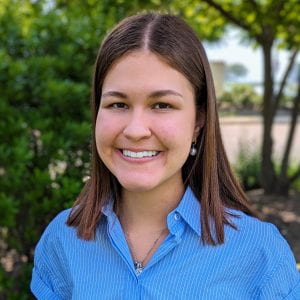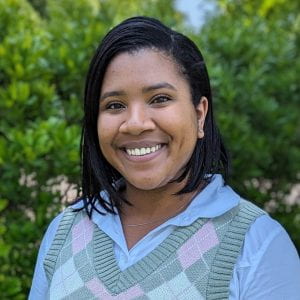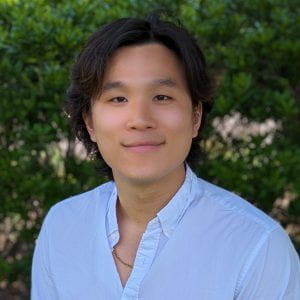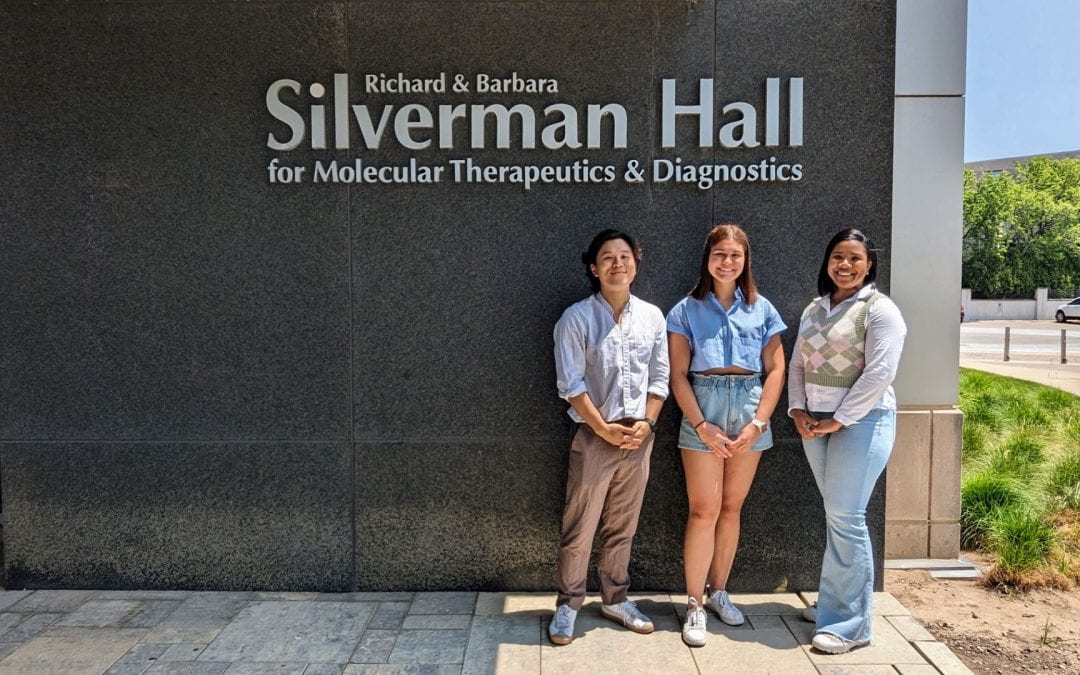Since its inception in 2009, the Chemistry of Life Processes Institute (CLP) has nurtured the research interests of dozens of undergraduates through its Summer Scholars Program. Program participants not only benefit from outstanding CLP faculty mentors; they receive training in the latest scientific methods, state-of-the-art instrumentation, and laboratory best practices. The Program supported three students this year: Gabriela Cosenza, Mychaela Mathews, and Adam Suh. They received stipends and research support through the generosity of donors to the Institute. The Scholars were selected through a competitive application process that weighed students’ research experience, aptitude, interest, endorsement by their CLP faculty member, and the interdisciplinary nature of their research.
“We love offering undergrads the opportunity to spend the summer on campus working full-time in CLP faculty labs. It gives them a chance to see how working in a lab professionally would be once they graduate. Plus, interacting with other students who plan to pursue advanced science degrees helps them build a network for the future,” Penelope Johnson, CLP Senior Project Coordinator, Education and Outreach. “It’s inspiring that these students choose to stay on campus to further their education. We are very proud of their work ethic and their dedication to learning. I love our students!”
CLP’s Summer Scholars Program serves as a launchpad for students who wish to pursue careers in chemistry, engineering, life sciences, and medicine—82% of graduated CLP scholars have pursued or received advanced degrees (MS, PhDs, and MDs). One of the hallmarks of the program is its commitment to supporting underrepresented students. The program provides students with a summer stipend and funds for lab supplies to devote 10 full weeks of hands-on interdisciplinary biomedical research in the laboratory of one of the Institute’s 75 renowned faculty.
Seminars and workshops sharpen students’ science communications skills and prepare them for presenting the outcomes of their research at the annual CLP Undergraduate Research Symposium. This year, the students also met with representatives from Northwestern’s career services, students in the MD/PhD program at Feinberg, and current graduate students so they could learn more about possible career paths once they graduate.
Another benefit for students in the program is the opportunity to publish their research findings. CLP Summer Scholars Program have contributed to 31 research papers as undergraduates and 95 publications in post-graduate positions and are well-prepared for a successful entrée into science careers.
This year’s CLP Summer Scholars were:

Gabriela Cosenza
Gabriela Cosenza
Hometown: Honduras, Central America
Year: 2nd Year
Major: Chemical Engineering
Minor: Biotechnology and Biochemical Engineering
CLP Mentor: Joshua Leonard (Chemical and Biological Engineering)
What was the focus of your summer research project?
The Leonard lab focuses a lot on working with synthetic biology and cell therapies. Synthetic receptors are very useful in improving cell therapies and immunotherapies for diseases such as cancer. A common problem with synthetic receptors is that they can be single signaling—meaning once they fulfill their purpose, they don’t degrade naturally, or at least they don’t do it fast enough, so they can act as competitive inhibitors to the active receptors around them. To improve the function of synthetic receptors, I want to engineer the selective degradation of the inactive receptors by engineering the synthetic receptors to include a degradation tag within them.
What made you interested in pursuing this line of research?
I have always been very interested in learning about the human body and diseases. For a long time, I thought that I wanted to become a doctor, but the more I looked into it, the more I realized that I was more interested in working behind the scenes. Instead of giving the treatments to the patients, I wanted to create the treatments. That’s how I got into the whole realm of chemical engineering and the biological side of chemical engineering.
Why did you apply for the CLP Summer Scholars Program?
I knew that I wanted to continue my research further beyond one or two hours a week during the school year. The CLP program not only provided funding for me to pursue full-time summer research but also introduced me to a small cohort of students with whom I meet regularly. I know that beyond summer, I can continue to connect with this group for the rest of the time I’m here at Northwestern.
What do you like to do when you’re not studying?
I have been playing the piano and the guitar since I was six. For the longest time, I saw that as a huge responsibility. Then, all of a sudden, I had a shift in perspective. Since then, I have enjoyed practicing, especially when I find myself to be stressed or need to take a break from work or studying.

Mychaela Mathews
Mychaela Mathews
Hometown: Vero Beach, FL
Year: 3rd Year
Major: Neuroscience with a concentration in chemistry
CLP Mentor: Yegenia Kozorovitskiy (Neurobiology)
What was the focus of your summer research project?
My lab studies the process of neuroplasticity. Our brain is made up of many different circuits, which is how information is passed from one place to another. These circuits are made up of neurons. Neurons are able to change their appearance and shape through a process called neuroplasticity. There is a chemical called psilocybin that is hypothesized to enhance the growth of protrusions on neurons—called dendritic spines—and therefore encourage neuroplasticity to occur. We expose different intermediates of psilocybin to neurons and analyze how they promote neuroplasticity. This is important clinically because any aberration neuroplasticity can manifest as psychiatric diseases, such as depression and PTSD.
What made you interested in pursuing this line of research?I have always been fascinated by the brain, and particularly the work in Professor Kozorovitskiy’s lab. The idea that we can analyze changes in neurons over time to understand the mechanisms of disease and explore potential treatments is very interesting to me.
Why did you apply for the program?
Eventually, I hope to become a physician. I’m not sure what kind, but I want to be able to elevate the standard of care for my patients by understanding the basic science behind the treatments that are prescribed through research. Although I’ve already had outstanding mentorship in the Kozorovitskiy lab, what has been different about CLP is that I’ve gotten to network with people who aren’t in my lab and have different experiences navigating both medical school and graduate school, which has been extremely helpful as I consider a future career as a physician-scientist.
What do you like to do when you’re not studying?
Time with my friends and family is what I cherish the most. In terms of special interests, I took Swahili for two years at Northwestern, which has been very helpful in enhancing my communication skills, both in Swahili and English. I am also a support group facilitator for a nonprofit called ‘Rainbows For All Children’ based in Evanston which provides mental health resources for children who have experienced loss. I got involved in this organization about a year ago to support others who have also experienced loss. I think it’s important to connect with the community where you live and reflect on how you can use your experiences to positively impact those around you. I also am an avid reader in my spare time.

Adam Suh
Adam Suh
Hometown: Natick, MA/Seoul, South Korea
Year: 4th Year
Major: Chemical Engineering
CLP Mentor: Daniel Arango (Pharmacology)
What was the focus of your summer research project?
I focus on epi-transcriptomic modifications, which are modifications that occur on the RNA, and how those modifications affect translation in cancer cells. Mutant or ‘incorrect’ protein production is one of many characteristics of cancer. We want to answer the question- How does the cell produce these ‘incorrect proteins’ but more specifically, what role do RNA modifications play in mutant protein production? There are many mechanisms known to cause this, but RNA is heavily involved in protein synthesis, so I want to explore its potential. More specifically, my research focuses on a specific modification tied to RNA oxidation, which occurs during a common physiological phenomenon called oxidative stress.
What made you interested in pursuing this line of research?
I have always found molecular biology fascinating. With COVID and the development of mRNA vaccines, there’s been a huge boom in RNA research. RNA is a very dynamic molecule with a lot of roles yet to be discovered. However, because this field is still so new, there are a lot of difficulties with experimental design. I learn something new every single day in the lab and I love being part of something so challenging.
Why did you apply for the CLP Summer Scholars Program?
The CLP is a prestigious grant and my PI suggested that I would be a good candidate for it. I looked more into CLP and talked to two award recipients from last year. I heard great things about CLP faculty and Penelope and the institutional support that goes above and beyond the lab work.
What do you like to do when you’re not studying?
I run a medical student start-up called MedKit. We offer over-the-counter products to undergraduate students on North campus. We are hoping to expand this year, increasing OTC accessibility to other students on campus!
I like a lot of physical activities like running and lifting and playing sports. I ran the Chicagoland marathon about four months ago.
by Lisa La Vallee
